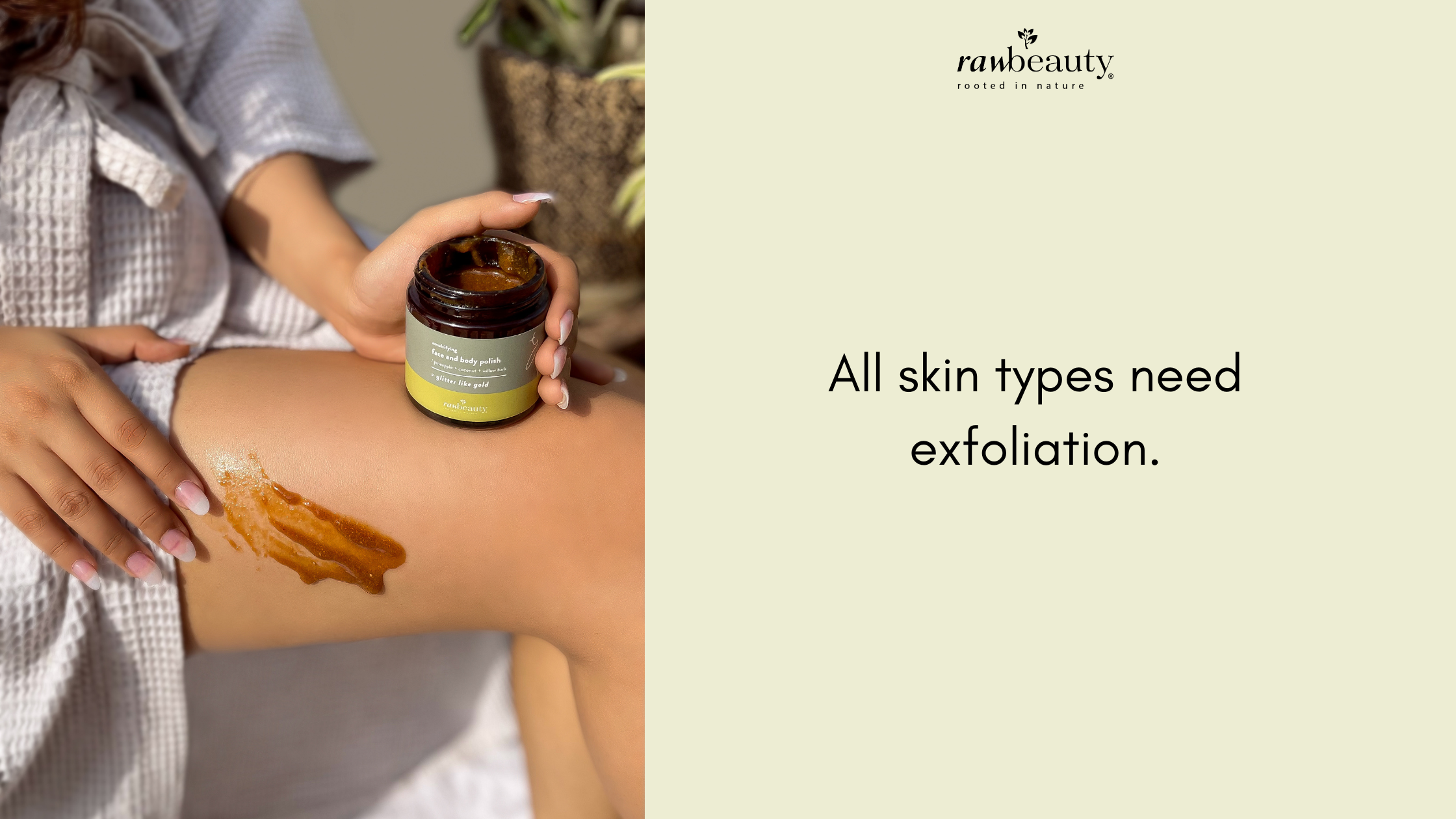
A Beginner’s Guide to Exfoliation
There is so much noise about exfoliation but very little information on the same. Everyone wants glowing and radiant skin but rarely do we pay attention to the signs our skin gives us. Our skin regenerates itself every 27 days however with age the cell turnover slows down and a layer of dead skin cells start forming on the surface of our skin. The dead skin cells further become friends with natural oils, dirt, pollution, makeup traces, sunscreen residue to form a layer that weighs our skin down and gives it a dull and dehydrated look. This is a wake up call for our skin and this is when exfoliation steps in!
Exfoliate Your Face
The skin of our face is soft and thin and easily gets damaged by excessive exposure to sun, pollution or everyday makeup. We need to gently exfoliate our face at least once a week and allow young and healthy cells to take their place. I personally love using Kick Ass ubtan to gently shed the layer of stubborn dead cells on my face. I combine the ubtan with some yoghurt and leave it on my face for 10-15 minutes before scrubbing it off with damp fingers. You can also choose to chemically exfoliate by using a Salicylic Acid serum like Dig Deep.
Related: How to Use Salicylic Acid Serum
Exfoliate Your Lips
Excessive sun exposure and dehydration makes our lips pigmented and flaky. Using a lip mask to gently exfoliate the lips twice a week helps in achieving soft and supple lips. I recommend Bloody Mary as it is packed with the goodness of Raspberry, Pumpkin Seed, Beetroot and Natural Vitamin E that lighten pigmentation and make the lips supple.
Exfoliate Your Body
If you spot some dry and flaky skin on your body, please know that your skin is actively shedding away skin cells and it is time to polish your skin. Enzymatic Exfoliation works really well in this case. Ingredients such as Pineapple Enzymes and Kiwi Enzymes break down the keratin in the skin’s upper layers which further lifts off the dead skin cells. Glitter like Gold is one such emulsifying face and body polish enriched with Pineapple Enzymes, Raw Honey, Coconut Flour, Raw Milk, Willow Bark and Turmeric that breaks and melts the glue that binds the dead skin cells to our skin.
Exfoliate Your Scalp
Yes, exfoliation also applies to our scalp! A buildup of dead skin cells along with sweat, dirt and pollution blocks our hair follicles and causes hair fall. Use an exfoliating scalp serum twice or thrice a week to detoxify your scalp.
Tools For Exfoliation
The tools we use for exfoliation also play an important role. Plastic loofahs and sponges are generally rough on our skin so it’s always better to opt for a natural loofah or a coconut husk foot scrubber to gently scrub off dead skin cells. For the face, I highly recommend using a Muslin Washcloth as it provides a gentle experience and promotes smoother, healthier and cleaner skin by keeping blackheads and whiteheads at bay.
Exfoliation is fun but don’t over do it! Always apply a moisturiser after polishing your skin and seal your lips with a nourishing lip balm.
Love,
Sunayana
Frequently Asked Question related to Exfoliation
Is exfoliation good for skin?
Yes, exfoliation is good for the skin, it helps remove dead skin cells, unclogs pores, and promotes a smoother, brighter complexion.
How to use exfoliating gloves?
To use exfoliating gloves, wet your skin and apply a gentle cleanser. Put on the gloves and massage your skin in circular motions, focusing on rough areas. Rinse thoroughly and moisturize after exfoliating.
How often should i exfoliate my body?
You should exfoliate your body 1-3 times per week, depending on your skin type and sensitivity.
Can i use body exfoliator on my face?
No, it's not recommended because body exfoliators are often too harsh for the delicate facial skin, which is more sensitive.
Can you use exfoliating gloves on your face?
No, it is not recommended to use exfoliating gloves on your face, as they can be too harsh for delicate facial skin.
Does exfoliating remove acne scars?
Yes, exfoliating can help fade acne scars over time by removing dead skin cells and encouraging cell turnover.
Leave a comment
This site is protected by hCaptcha and the hCaptcha Privacy Policy and Terms of Service apply.